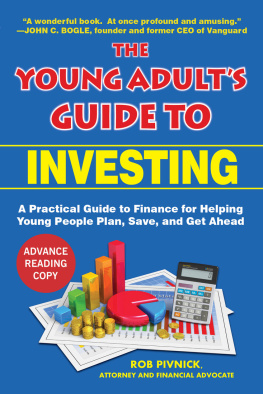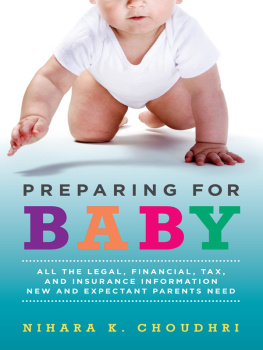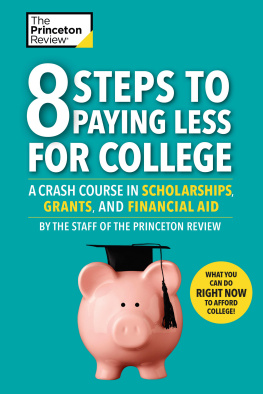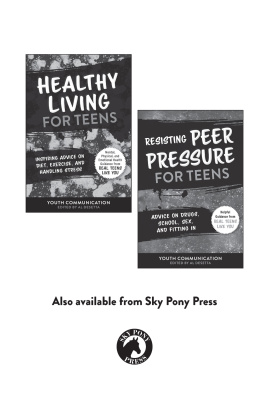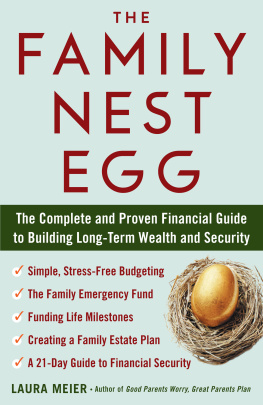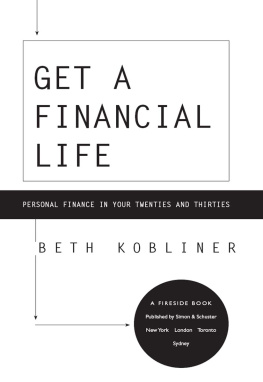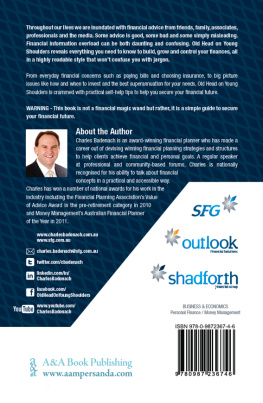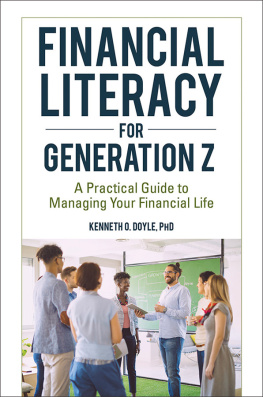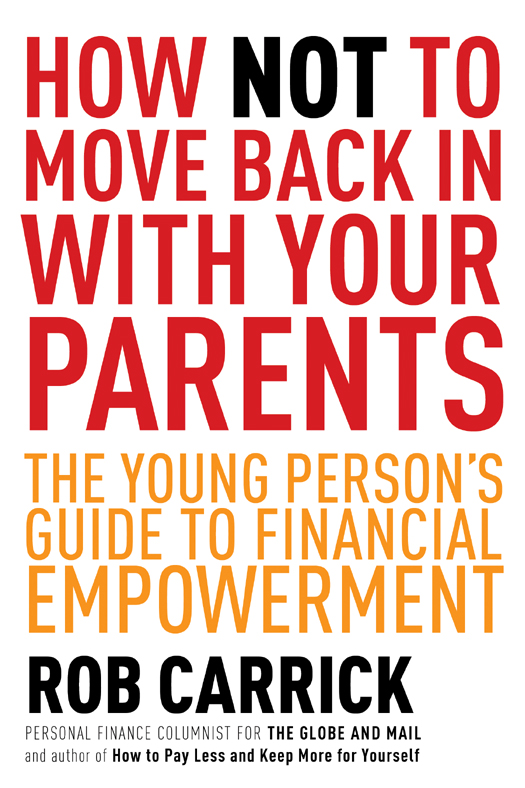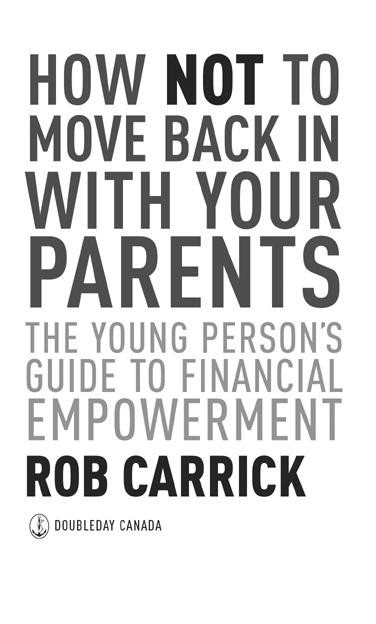Contents
Copyright 2012 Rob Carrick
All rights reserved. The use of any part of this publication, reproduced, transmitted in any form or by any means electronic, mechanical, photocopying, recording or otherwise, or stored in a retrieval system without the prior written consent of the publisheror in the case of photocopying or other reprographic copying, license from the Canadian Copyright Licensing Agencyis an infringement of the copyright law.
Doubleday Canada and colophon are registered trademarks
Library and Archives Canada Cataloguing in Publication
Carrick, Rob, 1962
How not to move back in with your parents: the young persons complete guide to financial empowerment / Rob Carrick.
eISBN: 978-0-385-67193-4
1. YouthCanadaFinance, PersonalJuvenile literature.
2. TeenagersCanadaFinance, PersonalJuvenile literature.
3. Finance, PersonalCanadaJuvenile literature. I. Title.
HG179.C375 2012 j332.024008350971 C2011-907435-4
Cover design: Paul Dotey
Published in Canada by Doubleday Canada,
a division of Random House of Canada Limited
www.randomhouse.ca
v4.1
a
CONTENTS
INTRODUCTION
The young people of today? I feel for you because youve got money problems. The cost of attending university or college is rising fast, and only students seem to care much. The job market is tougher than ever, houses are expensive and gas prices are on a one-way trip to exorbitant. Borrowing money is the easy solution to these problems, and God knows the older generation has embraced debt.
But times are different now. Following the Great Recession, which ended the last decade, the standards for responsible adult financial behaviour are higher. In government and in public schools, financial literacy is a big theme. Saving is in and unrestrained consumption is out. Its confusing as hell out there in the world now if youre in your twenties or thirties. On one hand, our consumer culture is telling you to live it up, and on the other, youre being told to spend and save wisely so you dont end up with the sort of financial problems that may burden your parents.
The pressure is on, but help is at hand. Whether youre in your late teens, your twenties or your thirties, this book is your personal finance manual. Well start with the financial ins and outs of attending college or university and then work our way forward through the milestones of a first credit card and first car, starting an RRSP and a TFSA, buying a home and then starting a family. Securing your financial independence is the main goal here, but well also look at times when the smart move is to ask for advice or assistance from your parents.
The family approach is how we do things now that the School of Hard Knocks (Financial Division) is closed down. You cant learn from your mistakes the way your parents and grandparents may have done. The world of money is just too dangerous these days. Thats the lesson of the financial shocks of the past several years. In fact, a very good case can be made that a lot of this turmoil was a result of people making avoidable mistakes with their finances.
What happens to twenty- and thirty-somethings who dont find their way in the world of money? In the long term, mistakes made with debt can cost them the opportunity to afford the home theyve always wanted, the trips they planned and a comfortable retirement. In the short term, they may be forced to join whats being called the Boomerang Generation. Thats the term used to describe people who left home to go to university and were then forced by financial problems to move back home.
Lets be honest here: part of the problem with people graduating from university and establishing themselves in the workforce is that they arent helping themselves as much as they could be. A financial adviser I know of named Kurt Rosentreter zeroed in on this subject in a blistering commentary in which he describes the massive hole he sees young adults digging themselves into these days (the title: Canadian 30-Year-Olds Are Screwed). He worries these young adults are putting more time into Internet surfing than managing their money. He worries they think too much about what they want to buy and not enough about the discipline of saving. He worries theyre spending too much on houses without thinking about the impact on their ability to afford everything else in life. And he worries theyre moving from employer to employer without pension plans or any retirement savings of their own.
Rosentreter argues that mistakes made by todays young adults will come together when they reach about age 50 to create a financial nightmare. Theyll be close to retirement, their children will be ready to go to college or university and they will have made almost no serious headway in savings. If they dont win the lottery, theyll have to work into their seventies.
Yes, this is a pessimistic and perhaps alarmist view. But its also a realistic assessment of whats ahead for young adults who dont understand that the financial decisions they make in the decade or two after high school will very likely shape the rest of their lives.
Im 48 as I write this, but I remember both the good and the bad financial decisions I made decades back. Youll read about them here, and youll also get the benefit of my more than a decade spent as personal-finance columnist for The Globe and Mail. I know the money challenges people face today. Ive heard the success stories and the disasters.
Youll find no lectures here, just clear and unbiased guidance on how you can get the best possible financial start to life as an adult. Lets get to work.
YOU AND YOUR PARENTS: DIFFERENT PERSPECTIVES ON FINANCIAL MATTERS
To get some ideas on how different generations view matters like debt and spending, I consulted Laura Parsons, a mortgage expert at Bank of Montreal with more than twenty-five years of experience in the financial industry. Here are some of her thoughts:
Family dynamics. People are getting married later and starting families later; also, dual-income families are much more common than they used to be.
Style of banking. Your generation does everything electronically (online, ATM and phone), whereas those in the previous generation were much more willing to do their banking in actual banks; interestingly, Parsons predicts an upswing in branch banking as people seek the personal touch in an impersonal online world.
Spending. Young adults today put more emphasis on having fun and buying all the latest toys (partly because theyre starting families later). Also, theyre very open to debt in forms like car loans, mortgages and even dont-pay-a-cent events.
Day-to-day finances. Balancing chequebooks is pass; todays young people are more likely to use credit cards and therefore less likely to track their regular spending through the week.
Houses. Parents were more willing to move into a modest home and either fix it up or move up later on; todays young people want it all right awaytheyre willing to renovate and theyre right on top of deluxe details like granite countertops.
ONE
AFFORDING COLLEGE OR UNIVERSITY
Whatever the cost of getting a quality post-secondary education, its worth it. Thats a bold statement, given that tuition fees at universities and colleges are soaring in a way that staggers even a hardened financial observer like me. But lets be realistic. In todays hypercompetitive world, most young people need more than a high school education to gain the skills and knowledge necessary to build a career thats both emotionally and financially rewarding.


